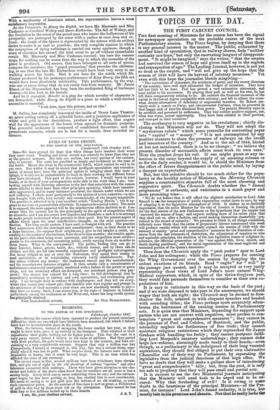EVILS OF LONG CREDIT.
TO THE EDITOR OF THE SPECTATOR.
Camberwell, 11th October 1847.
SIR—We have ground for hope that when things have reached their worst they must mend. Tradin and social morals can scarcely be lower than they are
g_
st the present moment. Not only one section, but every portion of the comma- nity, is tainted. The saint has gambled as deeply and recklessly as the man of the world. Hence the crisis in the commercial world, which cannot be said to be yet over. But whilst it may be stated that profligate speculation and miscalcu- lation of means have been the principal agents in bringing about this state of things, it would not be uninstractive to trace in their working the different forms they have developed. This part of the subject, however, I would leave in your hands, or in those of your correspondents more able to the work than I am; con- tenting myself with directing attention to the fact that coincident with the ceases above alluded to there have been other principles operating, which have consider- ably aggravated, and in many instances produced, the disease under which we are now suffering. I allude more particularly to the system of LONG CREDITS,—S sys- tem fraught with evils, both socially and commercially, of the largest magnitude. The practice is adverted to in your excellent article "Trading Morals "; but it ap- pears to me more en passant than otherwise. It commands especial notice. The more It is exposed, the more apparent will be the mischievous effects incident to it. I am aware that the system has its rise principally in the spirit of competition which SO abounds; and I am also aware how hopeless and thankless a task it is to attempt to make people understand what pertains to their good. But the present aspect of affairs forces upon the most unreflective—thought, on the most careless—re- flection. The long credit system, I have said, is fraught with evil. The practice first commences with the merchant and manufacturer: they, in their desire to do a large business, (to surpass their neighbours,) give to the retailer a credit, ac- cording to the nature of the business, from three to nine months; the retailer, again, on his part—this class being more numerous, and the competition more severe— grants to his customers, the consuming public, credit varying from six months to three years. What is the consequence? The public, finding they can go to their butcher, baker, grocer, tailor, &c., without money, and by them can be clothed and fed, are led into wasteful expenditure and profligate extravagance. Not being obliged to pay at once the tradesman, they spend their money in mad speculation, or in maintaining ruinously costly establishments. Pay- day comes without any money: the tradesman cannot pay the manufacturer; and the manufacturer becomes crippled. It then awaits only a concatenation of unfortunate commercial enterprises, combined with a failure in the potato or grain crops, and our monetary affairs are deranged, our merchant princes stop pay- ment! The disease has existed for a long time: its full development may be immediately attributed to railway and corn speculation, and overtrading gene- rally. I am brought daily in contact with shopkeepers, and they tell me every- where that money they cannot get; that families who were regular and prompt in the settlement of their accounts a year since are now absolutely unable to pay— they have no money. Such, I can assure you, is the state of business in Lond.on • particularly among the tradesmen at the West-end, where the long-credit system
l has principally obtained.


























 Previous page
Previous page